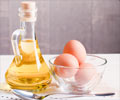An extract from coconut oil, called monolaurin, could be used as a microbial agent in foods, according to a study.
Monolaurin has been recognized as safe by the U.S. Food and Drug Administration (FDA) and is known for its antimicrobial properties.When used in combination with other antimicrobial agents, it could prove to be an effective barrier to microorganisms
Researchers from Zhejiang University in China studied the use of monolaurin as a nontraditional preservative in food products by combining it with commonly used antimicrobials in various concentrations and testing it on bacterial strains including Esherichia coli and on food components such as soy protein and water-soluble starch.
And they found that monolaurin combined with ethylenediaminetetraacetic acid (EDTA) a binding agent, was effective against Esherichia coli and Bacillus subtilis but not Staphylococcus aureus.
When combined with the antimicrobial nisin, monolaurin was synergistically effective against all three bacteria.
Researchers studied monolaurin's interaction with food components and found that its antibacterial effectiveness was reduced by fat or starch but was not affected by protein.
Advertisement
The study has been published in the Journal of Food Science.
Advertisement
SRM











